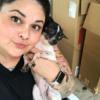-
Content Count
1,969 -
Joined
-
Last visited
-
Days Won
1
ShelterDog64 last won the day on November 16 2016
ShelterDog64 had the most liked content!
About ShelterDog64
-
Rank
Bariatric Master
About Me
-
Gender
Female
-
City
Tacoma
-
State
Washington
Recent Profile Visitors
-
 ProudGrammy reacted to a post in a topic:
Need encouragement that not everybody gains back all of the weight they lost after gastric sleeve
ProudGrammy reacted to a post in a topic:
Need encouragement that not everybody gains back all of the weight they lost after gastric sleeve
-
 ShelterDog64 changed their profile photo
ShelterDog64 changed their profile photo
-


Need encouragement that not everybody gains back all of the weight they lost after gastric sleeve
ShelterDog64 replied to hopeful333's topic in Gastric Sleeve Surgery Forums
I just had the 2-year anniversary of my VSG and I'm maintaining my 100 lb weight loss. It IS harder at this point, my restriction has relaxed a bit and it's not as insistent...I now rely on proper portioning and good eating habits vs letting the restriction keep me from overeating. I had very strong restriction for a year, slightly less until 18 mos, a small lessening after that and I expect it'll continue to lessen as time goes by. You have to discontinue any old, bad habits: grazing, eating crap carbs, soda, overindulging in alcohol, not exercising. Use the first year wisely and you can and should maintain, but if you waste that first year by eating what you want and thinking you can do that long term, you might find yourself in the 'regain' group. Your sleeve is a tool, a helper...it's not a solution. -
 ShelterDog64 reacted to a post in a topic:
Need encouragement that not everybody gains back all of the weight they lost after gastric sleeve
ShelterDog64 reacted to a post in a topic:
Need encouragement that not everybody gains back all of the weight they lost after gastric sleeve
-
-
-
-
-
-
-
-
-
-
-
-


Hair falling out at 4 1/2 months post-op
ShelterDog64 replied to LoriWhip's topic in Gastric Sleeve Surgery Forums
I had amazingly thick hair when I had surgery, and I'm here to tell you that even if you lose 75% of your hair, you won't die My shedding happened twice during the last 2 years, but my hair is almost back to normal. -
-


Perspectives on Losing Fast & Slow
ShelterDog64 replied to GreenTealael's topic in Gastric Sleeve Surgery Forums
This just makes my heart hurt. You need to be able to vent your frustrations and negativities in this space as well as in your 'real' life. This surgery thing is HARD. Yes, in some ways it's easier than doing the diet and exercise thing again, only to regain, but in other ways it's the hardest thing EVER. I am very, very lucky in that I have an amazing support system, and I've needed them at many points during the last 2 years. I got frustrated and quit posting here a while back, but reading this makes me realize the debt that us 'vets' owe to our support groups. So, to answer your original question, I had a pretty clear goal in my mind and always looked at the goal as something that I absolutely could attain. Some days when I'd get on the scale and it would be the same as the day before...that was defeating but I truly believed in the surgery and in the plan I was following. So I'd give myself a little pity party then get back to it...and I exceeded my goal within a year. I've had my plastic surgeries and I don't feel like a WLS patient anymore, I feel like a normal, thin-ish woman who eats small amounts at a time and doesn't feel self-conscious when I go out. Again, this is HARD. I don't think there's any way to adequately prepare ourselves for the crap, mental and physical, that's coming in that first year post-op. The hormonal changes, dealing with our personal relationship with food, accepting all the praise from everyone who sees us (this was the hardest for me...it got to where when someone would say 'Oh my gosh, you LOOK GREAT' I'd think 'damn, I must have looked BAD'), the saggy skin and being dehydrated and constipated or the opposite...it's just a long, complicated slog. But I can tell you that after a couple of years, it CAN be awesome! Yes, I still need to log my food, avoid carbs, exercise and be aware of my old habits, but it's easier and more routine every day Message me when you hit 2 years out...I want to know where you are and how you feel! -
 ShelterDog64 reacted to a post in a topic:
Any Gastric Sleevers 300 pounds or less before surgery lose 100 pounds afterwards?
ShelterDog64 reacted to a post in a topic:
Any Gastric Sleevers 300 pounds or less before surgery lose 100 pounds afterwards?
-
 ShelterDog64 reacted to a post in a topic:
Any Gastric Sleevers 300 pounds or less before surgery lose 100 pounds afterwards?
ShelterDog64 reacted to a post in a topic:
Any Gastric Sleevers 300 pounds or less before surgery lose 100 pounds afterwards?
-
 ShelterDog64 reacted to a post in a topic:
Any Gastric Sleevers 300 pounds or less before surgery lose 100 pounds afterwards?
ShelterDog64 reacted to a post in a topic:
Any Gastric Sleevers 300 pounds or less before surgery lose 100 pounds afterwards?
-


The one thing you could not live without post surgery
ShelterDog64 replied to Oceanlove's topic in POST-Operation Weight Loss Surgery Q&A
For your surgery, something to walk the halls of the hospital in, a charger for your phone and a chapstick. Seriously, that's it. You'll get all the other stuff you need from the hospital and you'll be discharged before you know it anyway. Gas X doesn't help with the kind of gas pains you get from laparoscopic surgery, so I knew I didn't need that. Those dry mouth sprays are nasty to me, so I just drank water when my mouth felt dry (win/win!). I would never take my own pillow to the hospital (staph/strep/pseudomonas/MRSA/other ick) so I just asked for extras until I was comfortable. At home, you need to drink water and protein drinks, so having a couple of options to choose from is great. You need a reliable scale, I opted to spend the $$ to get one that synchs with my Fitbit, so I have a record of every time I stepped on the darned thing. A couple of water bottles that make you happy are nice to have...I filled a gallon container every day, still do, and made finishing that my goal. You won't be able to do it for the first few weeks, but it was nice to be able to just look at it to know how much I'd had that day. Things I wish I hadn't wasted money on: a Nutribullet (which I used for a month and haven't touched since) , tons of different protein powders (I found the ONE and threw the rest out, should have tried them individually or a couple at a time), too many protein bars, too many clothes in the early months. Mostly, you need supportive people and a realistic idea of what the immediate post-op period is going to be like Good luck! -
-
-
-


Any Gastric Sleevers 300 pounds or less before surgery lose 100 pounds afterwards?
ShelterDog64 replied to Beta98's topic in Gastric Sleeve Surgery Forums
My starting weight is the same! I’d love to be 160 at the end. I’m only about 5-6 weeks out from surgery and have lost almost 30 pounds... I’d love to hear about your journey. Do you feel like some things were an extra help to you? Do you exercise a lot? Do you attribute it to the surgery, or other important variables too? Obviously, the surgery is the biggest part of the weight loss...no way could I have done it without being sleeved. I REALLY followed my nutrition plan, religiously, for the first year. No 'cheating' or whatever you want to call it...I buckled down and did my program. I pushed protein like crazy that first year, and ate very few carbs. I lost mostly body fat and not much of my muscle due to eating that way. I was very lucky, having the surgery put my fibromyalgia, early arthritis and psoriasis into remission; it also lowered my blood pressure so much that I left the hospital off all meds. Those changes in my inflammatory pain made it so much easier for me to exercise, which in turn made the weight loss go faster. I lost about 50 lbs in the first 3 months, 25-ish the next 3 months and the remainder of my loss was slow and over the rest of that first year. I only exercise moderately, I'm just much more active than I was at 262. My fitness level is much better; for example, we just went to Alaska and I was able to hike over 15 miles a day for days on end, without any preparation. Now I'm moving into the time when my restriction has eased up a bit and my stomach is more tolerant of foods. I had quit tracking and have been just eyeballing portions, and I gained 4 pounds on my 2 week vacation. We drank beer or wine daily, and I had dessert several times, so the gain wasn't a surprise but it did remind me that I have to put in the effort to track, watch my alcohol intake closely and skip desserts. I've already lost 2 of the 4 I gained, which is a relief. It's a life long effort, aided by the restriction of my sleeve, not a miracle cure...and it's the best thing I've ever done for myself <3 -


Any Gastric Sleevers 300 pounds or less before surgery lose 100 pounds afterwards?
ShelterDog64 replied to Beta98's topic in Gastric Sleeve Surgery Forums
I started at 262, got down to about 153. Now I'm 2 years out and sit at about 160. It's very doable. -


Starting to think about clothes
ShelterDog64 replied to greenreader's topic in Gastric Sleeve Surgery Forums
I bought jeans that fit, for every size. That alone made me feel attractive and slimmer. I also, as I passed through sizes, got rid of EVERY SINGLE piece of clothing that was too big. Ebay is a great source for less expensive name-brand clothing. Some of us don't need an extensive wardrobe and some do, and some of us blow through sizes so fast that you don't want to spend a penny on that size. I started out in an 18, never bought a single size 14 and have ended up, at 18 mos post-op, in a size 8. I bought too many 10s, but I'm selling them on ebay! My support group has a clothing swap, and it was helpful! -


Starting to think about clothes
ShelterDog64 replied to greenreader's topic in Gastric Sleeve Surgery Forums
I bought jeans that fit, for every size. That alone made me feel attractive and slimmer. I also, as I passed through sizes, got rid of EVERY SINGLE piece of clothing that was too big. Ebay is a great source for less expensive name-brand clothing. Some of us don't need an extensive wardrobe and some do, and some of us blow through sizes so fast that you don't want to spend a penny on that size. I started out in an 18, never bought a single size 14 and have ended up, at 18 mos post-op, in a size 8. I bought too many 10s, but I'm selling them on ebay! My support group has a clothing swap, and it was helpful! -


Why BMI is often dead wrong
ShelterDog64 replied to Creekimp13's topic in Gastric Sleeve Surgery Forums
I've had both RMR and Air Displacement Plethysmograph (ADP) testing done as part of my pre-op pathway. The RMR was way off, IMO, as it said that my rate was sufficient to support almost 3000 cals/day. What???? The ADP, otoh, was very realistic as I have a somewhat lower body fat number for my height and weight. I hate the BMI charts...they all say my sweet spot is right around 140 lbs. I can't imagine being 145, I wasn't that light when I was in the Army, training daily and 20-something years old. I'm at about 165, wearing a size 8 at 53 years old and it's really close to an ideal weight for me. I wouldn't mind losing about 5 more, but I'd be too thin at 140. My surgeon isn't hung up on BMI...he's all about getting off BP meds, lowering your hA1c, being able to move more, feeling better, liking your appearance more. He says that every pound lost is a step in the right direction and that we should all embrace our individual differences. I saw him at a social event a couple of weeks ago and he told me that he barely recognized me...until he saw me smile, then he knew who I was. That made me SO happy -


Bypass , sleeve, lapband?
ShelterDog64 replied to Rudedogg89's topic in General Weight Loss Surgery Discussions
Just to encourage you, I started about your weight with moderate-severe sleep apnea. I was able to discontinue my cpap about 3 months ago (15 months post-op) and I feel great! It's the best feeling, sleeping without that damned thing AND waking up rested. -


How to tell a loved one you plan to get WLS?
ShelterDog64 replied to AK37's topic in PRE-Operation Weight Loss Surgery Q&A
My spouse was very supportive, which I'm thankful for, but my mother was NOT. It was hard, but I just told her straight up that I'd started the pathway and would be having the surgery. That I was tired of carrying that extra 100 lbs around, having high blood pressure, being pre-diabetic, hating the way I looked and felt. She argued, suggested some crazy-ass diet pills, told me I wasn't fat (ha!) and then cried. Honestly, she was just frightened that something would happen to me...like so many people, she didn't know anyone who'd had WLS and been successful, she only knew someone who knew someone who'd died or another of the innumerable horror stories out there about the surgery. Now, she's my biggest cheerleader and fan...in some ways, it's helped our overall relationship. My advice is to tell them you're doing it, not asking for permission, and tell them you need their support. If they truly care about you, they'll be there when you need them. -


Maybe the regain has nothing to do with emotional eating or bad food choices?
ShelterDog64 replied to setoo's topic in Gastric Sleeve Surgery Forums
This is DEFINITELY the case for me. Nothing satisfies my need for food (which is far different than hunger) better than a dense protein and a vegetable. It might be cheese, it might be chicken, maybe beef, but if I eat my protein portion and then vegetables for the rest of my meal, I'm fueled up for whatever comes after. Some meals I also eat a grain like farro or a little brown rice along with the vegetable. But when I decide that a slice of thin-crust pizza is what I'm going to eat, I KNOW I'll be looking for a snack in a couple of hours. I lost all my weight (100 lbs) in 9-ish months with the sleeve. I've now been maintaining in a 3 lbs swing range for another 9 months. I *can* eat more per meal, but my activity level seems to be high enough that there's no gain...for example, at 6 months out, I could only eat 2-3 oz chicken, now I can eat 4-6 oz. My program advocated getting up to about 1000 cals/day by 4 months or so, and I followed that advice. Now I eat more like 1600-1800/day. I've had my plastics work done that I wanted, so now I'm finally getting to 'real' life with this sleeve and my more cooperative body. I'm active (but not running miles a day), I have energy, I drink a little wine and have a piece of chocolate every now and then. I eat meat, eggs, cheese, butter...I don't drink protein shakes much anymore and I don't use artificial sweeteners. I truly believe this is how healthy people live and eat...whole foods, small portions, very little junk food, desserts are rarities instead of daily, get up and move every day in a meaningful way. My sleeve gave me the ability to restrict my intake until I could train my brain and my body for this way of life instead of my old stomach that screamed for food constantly, and was killing me by doing it. As to regain, I'm not sure I agree with your premise but it's an interesting posit. Did you look at only sleeve data or did you include roux en Y as well? Among my small sample set of support group members, every gain seems to be precipitated by out of control eating, not drinking enough water, slacking on exercise...all the things we all know will cause issues down the road. -
It's definitely not a "never" thing for sleeve patients, but it is much less likely to occur in someone who's had a VSG than someone who's had a bypass. I'm sorry it's happening to you! Also, I have reactive hypoglycemia and it feels VERY much like dumping but I've had it for years...happens when I eat simple carbs.
-


Lacking the motivation to even walk...
ShelterDog64 replied to sleevedshereen's topic in Gastric Sleeve Surgery Forums
That's not bad, but can you find some places to slip in some more protein? The protein and the extra calories it brings may bring your energy level up a bit. What are you drinking on the way to work? Make it a protein shake or add some protein powder to your coffee/tea/water. Add some powder to your yogurt, drink a glass of Fairlife milk in the afternoon...whatever you can. Nibble on a protein bar during the day. It's very hard in the first few months to get the nutrition you need without supplementing, in my experience. And I STILL, over a year later, add a 30g scoop of protein to my coffee every single morning. It's like insurance for the rest of the day for me. -


Your feelings on hummus
ShelterDog64 replied to gwbicster's topic in POST-Operation Weight Loss Surgery Q&A
First, remember that although it seems like a very long time, 8 weeks isn't long at all. It takes a surprisingly long time to get back to 'normal', or really to get to whatever your NEW 'normal' is going to be. Be gentle on yourself Dense protein is hard, and I've struggled with it since I was on solids last years. I'm now 14 mos post-op and I still have a hard time with meats. Just a couple of nights ago I spent a couple of hours foaming and sliming because I ate some grilled pork tenderloin. By far, fish is easiest for me to tolerate...salmon, cod, tuna, all shellfish. They all go down easy and stay down. I used to be a beef-a-holic, now I maybe have a few bites a month. Chicken is hit or miss, dark meat easier than breasts. One tip: the moister the meat, the easier it is for me. I have a pressure cooker and make Indian chicken dishes in it often and the cooking method keeps the meat moist and makes it very tender. So, if you can use a sauce of some sort, that may help. Have you tried eggs cooked different ways? I started with scrambled, which were a disaster, but I've found that I can eat them poached and boiled, but not fried or scrambled. And to the main point of your post, hummus can be a good option for limited use, but it alone won't trigger any restriction in your sleeve the way a dense protein will, so keep that in mind. It's more of a 'slider' food, so while it'll help you in a nutrition sense, it won't be as satisfying as some chicken or salmon. That said, at 8 weeks I was eating what I could get my stomach to like and retain, with an emphasis on any form of protein that worked. I mixed protein powder into mashed potatoes, cream of wheat, oatmeal, cottage cheese, yogurt, ricotta cheese, etc. Really anything that appealed and was slightly soft and moist will work. And you have to decide how many grams of carbohydrates you're going to eat each day, how much space you have for those carbs related to your protein and form a long-term plan with that as a basis. I'm kind of on auto-pilot now with food, but I counted every. single. bite. for the first year. Doing that taught me what my 'danger' foods are, how I react to simple carbs, how often I need to eat to meet my protein and nutrient goals, etc. It's a lot to think about in the beginning, but it gets MUCH easier as time goes by. Good for you for thinking about what you're doing now as potential habits for the future...you sure seem like you've got what it takes to be successful at this whole WLS thing!




















